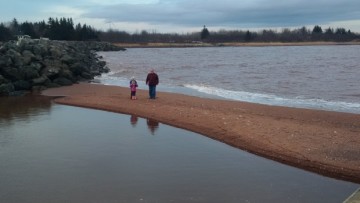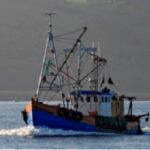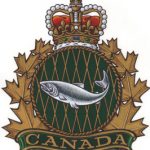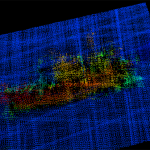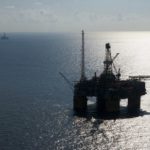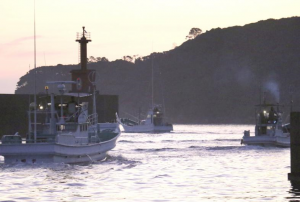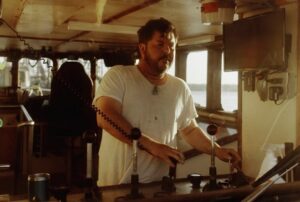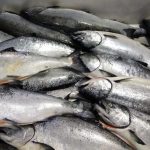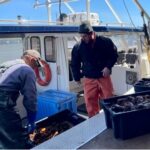Tag Archives: scallop fishermen
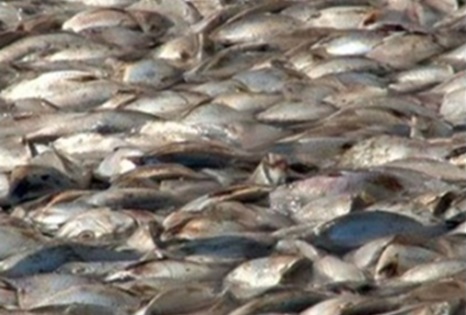
New Rutgers Study Confirms Hypoxic Event Last Summer off the New Jersey Coast by Jim Lovgren
In a scientific report released in December 2023 by Associate Professor Grace Saba, and Professor Josh Kohut using underwater robots, called “Gliders” to track ocean water quality, specifically, oxygen concentrations and PH levels, the researchers discovered that large areas of the New York Bight suffered a hypoxic event last summer. The study suggests that any of a number of factors could have caused these conditions, including a change in normal ocean stratification, increased input of nutrients which increase phytoplankton production, increased sea temperatures, and a few more. Conveniently missing from the possible causes of this hypoxic event is the impact of the offshore wind research vessels that have been extensively using high powered sonar and seismic devises throughout the New York bight area for over a year now. Also ignored was any outreach to the scallop fishermen along the coast who have been reporting unusual amounts of “clappers”, which are dead scallops, in their tows. In an article posted in the spring of 2023 in Fisherynation.com, “Is the Great Fishkill of 1976 About to be Repeated?“, I suggested that the New York bight could see an environmental catastrophe that could rival or surpass the great fish kill of 1976 and would be caused by the decomposing bodies of the dead sea creatures killed by the seismic and Sonar assault on the ocean bottom by offshore wind research vessels. Links, more, >>click to read<< 19:46
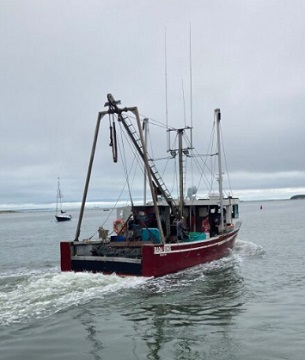
The Cape’s Scallopers Ride Out a Perfect Storm
This summer, a perfect storm combining sky-high fuel costs, a scarcity of experienced crew members, low wholesale prices, sharp declines in what scallop fishermen are allowed to take, and costly quota, has been keeping Cape Cod’s small-boat scallopers off the water. “There are a quite a few changing over to do other kinds of fishing because they can’t afford to go scalloping right now,” said Max Nolan, a scalloper from Eastham who owns the F/V Outlaw. “I don’t know how anyone is making it,” said Chris Merl, a Wellfleet scalloper and captain of the F/V Isabel & Lilee. Atlantic scalloping, which stretches from the waters of Maine to North Carolina, is one of the most lucrative fisheries in the nation, with its yearly catch valued at upwards of $500 million. But this year (the fishing year begins in April and ends in March), regulators have dropped the total amount of scallops boats are allowed to harvest to its lowest level in over a decade, and the limit stands at just 41 percent of what it was in 2019. >click to read< 08:55
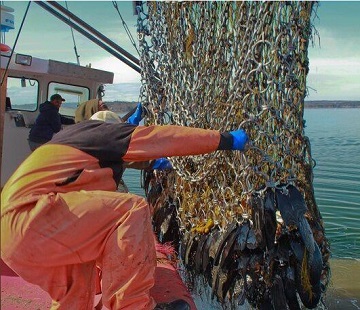
Scallop season winds down
As the state’s commercial scallop season winds to a close, federal regulators on April 1 decreased the amount that draggers can land in 2023 in the Northern Gulf of Maine by 25,000 pounds. Total landings for the NGOM for 2023 are 434,311 pounds, the National Oceanic and Atmospheric Administration (NOAA) announced March 31 as part of its overall NGOM Management Plan for 2023. Vessels are limited to possessing 1,666 pounds of in-shell scallops. NOAA had closed the NGOM scallop fishery on May 26, 2022, when its quota had been landed, effective through March 31 of this year, with Maine and Massachusetts vessels exempted if they were exclusively fishing in state waters. >click to read< 16:28
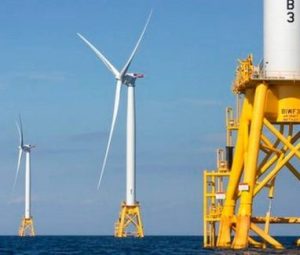
This Blows! Fishing industry raps proposed wind energy grid
“The proposed layout specifies that turbines will be spaced 1 nautical mile (nm) apart, arranged in east-west rows and north-south columns, with the rows and columns continuous across all New England lease areas.” But the claim that the newly proposed layout would satisfy the requests of the fishing industry did not entirely hold up once the developers’ plan was released publicly Tuesday morning. An organization that advocates on behalf of the scallop industry said its members were not consulted,,, >click to read< 19:41
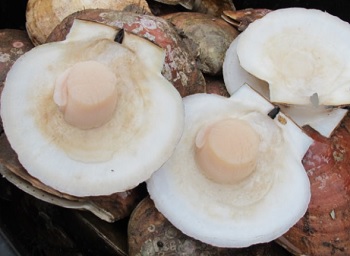
Value of Maine scallop landings dropped by 37 percent last year
Maine’s 2018 scallop harvest fell by 37 percent in value and by 30 percent in volume from the prior year, according to state officials. Despite the dropoff, the fishery continues to be relatively productive and lucrative compared to its poor condition in the 2000s. Maine scallop fishermen netted 563,000 pounds of scallop meat with a cumulative dockside value of $5.9 million in 2018, continuing a streak of six straight years in which the fishery has produced nearly half a million pounds or more of scallop meat and at least $5 million in statewide landings value. >click to read<09:56
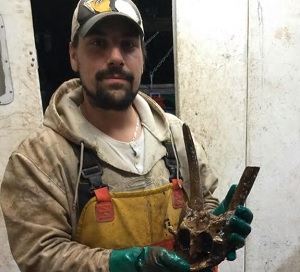
Scallop fishermen find walrus skull in Bay of Fundy
What was going to be a cold day out dragging for scallops on the Bay of Fundy turned out to be an exciting one for the captain and crew of the Sitansisk 1. In the scallop drag, David Underhill, a 28-year-old crew member from St. Mary’s First Nation in Fredericton, discovered a walrus skull with tusks attached. “It was first thing in the morning, it was our first tow and we were just going out to pick the table to get the scallops on board, and I seen it right away.” What Underhill could see among the scallop shells was the walrus skull and tusks. Photo’s, >click to read<13:51
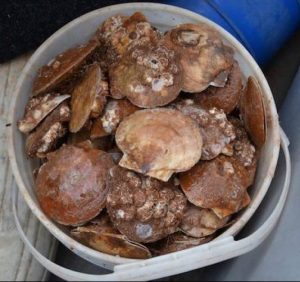
Newfoundland scallop fishermen left high and dry
I’m sitting here thinking about how our elected government is forcing our 3PS scallop fleet to destroy the only bit of fishing ground (north bed) that they gave our fleet to fish in 2006 by building invisible fences around the rest of the grounds which are known as the southern and middle beds. We always had the right to fish there, but inside those fences now only the offshore fleet from Nova Scotia is allowed to fish. How criminal this is for is Newfoundland fishermen to be banned from fishing our own waters where we can fish for any other species. Paul Snook, Fortune >click to read<10:46
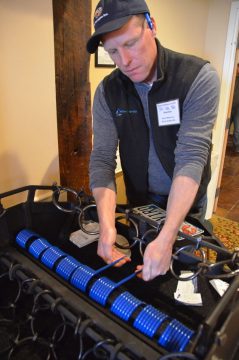
Maine: Scallop fishermen near end of season
The Maine scallop fishing season opened during the first week of December and now, with two weeks or less remaining, reports on how good a season it has been are decidedly mixed. On the good side of the ledger, there seemed to be plenty of scallops, often in places where none have been seen for years, Melissa Smith, who coordinates scallop management for the Department of Marine Resources, said last week. >click to read<11:16
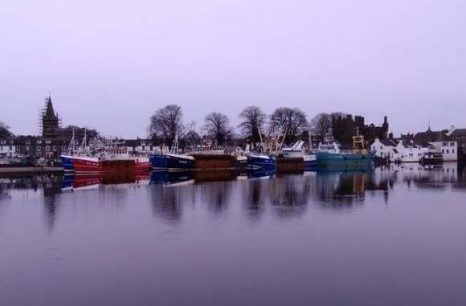
Kirkcudbright scallop fishermen set to be hit by Isle of Man law changes
Fishermen at Kirkcudbright are likely to be hit by law changes on the Isle of Man. The Manx Department of the Environment, Food and Agriculture have ruled that all boats fishing for scallops in their waters must report to their ports every day. The requirement – due to come into effect on January 8 – could have a devastating effect particularly at Kirkcudbright, which is the country’s top scallop-landing port. click here to read the story 12:47 
FISH-NL applauds appeal court decision reaffirming FFAW failed its membership
 The Federation of Independent Sea Harvesters of Newfoundland and Labrador (FISH-NL) applauds an appeal court decision today reaffirming the FFAW failed its membership. The union had appealed a March, 2016 Supreme Court of Newfoundland and Labrador ruling in favour of scallop fishermen who took the union to court over a compensation fund for lost fishing grounds in the Strait of Belle Isle. In the unanimous ruling handed down today, the three judges with the Supreme Court of Newfoundland and Labrador, Court of Appeal, found that the “FFAW was clearly acting outside its usual role and did not appreciate the full implications of its behaviour.” Click here to read the press release 14:54
The Federation of Independent Sea Harvesters of Newfoundland and Labrador (FISH-NL) applauds an appeal court decision today reaffirming the FFAW failed its membership. The union had appealed a March, 2016 Supreme Court of Newfoundland and Labrador ruling in favour of scallop fishermen who took the union to court over a compensation fund for lost fishing grounds in the Strait of Belle Isle. In the unanimous ruling handed down today, the three judges with the Supreme Court of Newfoundland and Labrador, Court of Appeal, found that the “FFAW was clearly acting outside its usual role and did not appreciate the full implications of its behaviour.” Click here to read the press release 14:54
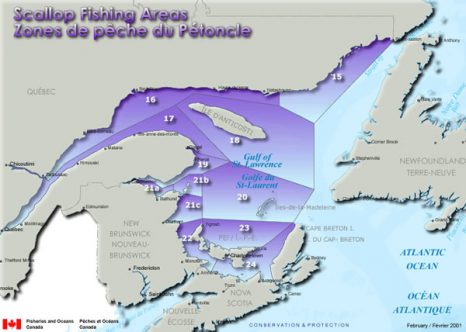
P.E.I. scallop fishermen propose temporary exclusion zone compensation go to rationalization
Prince Edward Island scallop fishermen are proposing the money Maritime Electric is promising as compensation be applied towards rationalization. The utility is offering $500,000 as compensation for keeping scallop fishermen out of part of their zone this year. The Department of Fisheries and Oceans has agreed to a request from Maritime Electric to impose a fishing exclusion zone across the Northumberland Strait off Borden where the utility is currently laying new submarine power cables. The area, which includes some of the best scallop fishing beds in Scallop Fishing Area 22, is expected to be in place for most of the month of May. The five-week scallop fishery opens May 1 and involves fishermen from both sides of the strait. Of the 130 license-holders in New Brunswick and 60 in P.E.I., about 60 to 70 of them are active each year. click here to read the rest. 21:23
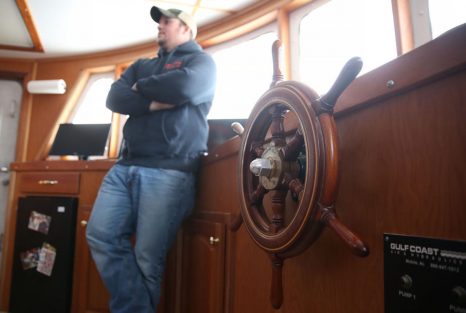
Cape May fishermen chase scallops despite risks, trade-offs
Scallops caught by boats based in southern Cape May County may end up on your plate at a local restaurant, or in the frozen foods section of a Wal-Mart or Costco, or even in foreign countries like France. But before the delicious white mollusks end up frozen in a chain store or fresh at a restaurant, commercial fishermen have to scrape them from the bottom of the ocean floor. It’s a fairly lucrative business that fuels a commercial fishing industry worth tens of millions of dollars each year. But the job takes an emotional toll on the fishermen who must leave their families for up to two weeks at a time to go to sea. Tom McNulty Jr.’s wife, Mandy, gave birth Feb. 16 to a daughter. Zoe McNulty was born at 7 pounds, 12 ounces, the proud father announced recently. But with scallop season quickly approaching, he’s going to have to leave them to go make a living.,, “It’s hard on your family,” he added. “You miss birthdays. You miss graduations.” Photo gallery, continue reading the article here 10:17
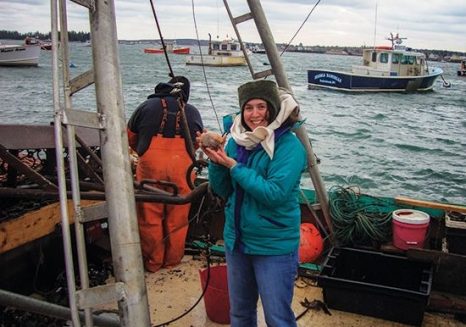
Maine Scallop fishermen stay close to home
Scallop divers might have been feeling optimistic, due to a steady increase in landings in recent years, when the fishery started for the winter season on Dec. 1. But the number of scallop draggers showing up in Cobscook Bay on their opening day, Dec. 5, seemed to indicate a certain pessimism. Trisha Cheney, the resource management coordinator for scallops for the Maine Department of Marine Resources told The Quoddy Tides that only 69 boats showed up for opening day. That’s about half the size of the fleet that has been in the bay at the start of the season during many years. Almost all of the boats were local Cobscook Bay boats. In the past, many draggers from ports to the west have traveled to Cobscook Bay to fish. This year, the fleet was apparently more spread out. Cheney told the paper that 76 draggers were fishing in the Jonesport area this year. Read the rest of the story here 14:03
Scallop fishermen protest at Clearwater plant in Grand Bank for Access to Traditional Grounds
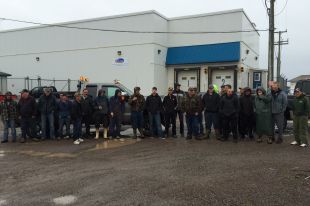 Wayne Meade, one of the organizers of the protest, said fishermen in the area are fed up and want answers from their union – Fish, Food and Allied Workers (FFAW-Unifor) – and the federal government about access to nearby fishing grounds. The harvesters believe they should be able to once again fish the southern and middle scallop beds on St. Pierre Bank, Meade said. “We had a licence to fish anywhere on St. Pierre Bank for 25, 30 year. Overnight that was took from us in 2006 and give to Clearwater and the offshore boats – the companies,” Meade said. Meade said inshore fishermen were then limited to the northwest part of the bank, which had already been largely raked clean by factory trawlers. Read the rest here 07:18
Wayne Meade, one of the organizers of the protest, said fishermen in the area are fed up and want answers from their union – Fish, Food and Allied Workers (FFAW-Unifor) – and the federal government about access to nearby fishing grounds. The harvesters believe they should be able to once again fish the southern and middle scallop beds on St. Pierre Bank, Meade said. “We had a licence to fish anywhere on St. Pierre Bank for 25, 30 year. Overnight that was took from us in 2006 and give to Clearwater and the offshore boats – the companies,” Meade said. Meade said inshore fishermen were then limited to the northwest part of the bank, which had already been largely raked clean by factory trawlers. Read the rest here 07:18
East Coast Fishermen voice objections over plan for wind farm off New York coast
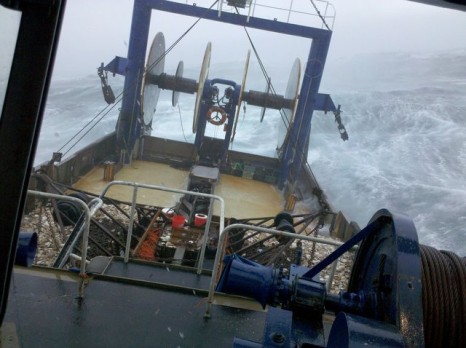 A long-stalled plan to build a forest of power-producing windmills off the coast of New York may finally be gathering momentum, and that is sparking concern among commercial fishermen who fear the giant turbines will ruin an area rich with scallops and other sea life. Federal officials announced earlier this month that they would auction off the rights to build the wind power farm on a 127-square-mile wedge of the Atlantic Ocean. The tip of the wedge begins about 11 miles south of Long Island’s popular Jones Beach and spreads out across an area, sandwiched between major shipping lanes, where trawlers harvest at least $3.3 million worth of sea scallops each year, as well as smaller amounts of mackerel, squid and other species, according to a study commissioned by the Bureau of Ocean Energy Management. “There’s got to be a better place,” said Eric Hansen, a scallop fisherman based in New Bedford, Massachusetts. Read the rest here 08:39
A long-stalled plan to build a forest of power-producing windmills off the coast of New York may finally be gathering momentum, and that is sparking concern among commercial fishermen who fear the giant turbines will ruin an area rich with scallops and other sea life. Federal officials announced earlier this month that they would auction off the rights to build the wind power farm on a 127-square-mile wedge of the Atlantic Ocean. The tip of the wedge begins about 11 miles south of Long Island’s popular Jones Beach and spreads out across an area, sandwiched between major shipping lanes, where trawlers harvest at least $3.3 million worth of sea scallops each year, as well as smaller amounts of mackerel, squid and other species, according to a study commissioned by the Bureau of Ocean Energy Management. “There’s got to be a better place,” said Eric Hansen, a scallop fisherman based in New Bedford, Massachusetts. Read the rest here 08:39
Scallop fishermen poised for fight over shellfish, fishermen and regulators to meet Wednesday
Scallop fishing has increased dramatically off some parts of New England recently, and 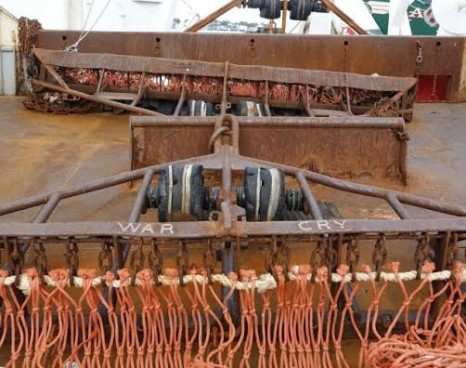 will soon meet to discuss how to avoid overexploiting the valuable shellfish. The concern over scallop fishing centers on the northern Gulf of Maine, a management area that stretches roughly from the waters off of Boston to the Canadian border. Scallop grounds off of northern Massachusetts have been especially fertile, prompting increased fishing in that area. The New England Fishery Management Council, a regulatory arm of the federal government, will hold a public meeting about the issue Wednesday (links here)and decide how to proceed. Alex Todd, a Maine-based fisherman who fishes off of Gloucester, Massachusetts, said he and others feel the rules are not equal. Read the rest here 11:46
will soon meet to discuss how to avoid overexploiting the valuable shellfish. The concern over scallop fishing centers on the northern Gulf of Maine, a management area that stretches roughly from the waters off of Boston to the Canadian border. Scallop grounds off of northern Massachusetts have been especially fertile, prompting increased fishing in that area. The New England Fishery Management Council, a regulatory arm of the federal government, will hold a public meeting about the issue Wednesday (links here)and decide how to proceed. Alex Todd, a Maine-based fisherman who fishes off of Gloucester, Massachusetts, said he and others feel the rules are not equal. Read the rest here 11:46
Scallop Fishermen haul ice age walrus skull from the Bay of Fundy
Scallop fishermen have dragged more than they bargained for out of the Bay of Fundy near Saint John, pulling up a walrus skull that dates back to the ice age. “It just came up on the dragger and I just thought it was a piece of stick at first,” said Todd Paul, a fisherman from St. Mary’s First Nation. “It’s pretty cool.” The skull was pulled from the waters about 2.5 kilometres off of Cape Spencer. “We were guessing what it was,” he said. “Once we seen a tusk coming out of it, I knew it was like a walrus of some kind.” Read the story here 09:12
FFAW ‘lied to and misled’ members about scallop settlement, says lawyer
 A lawyer for scallop fishermen in the Strait of Belle Isle says the Fish Food and Allied Workers union lied to and misled members about a settlement with Nalcor. David Goodland made the comment Monday in the Supreme Court of Newfoundland and Labrador, where he summed up the case brought brought by 71 fishermen from the Great Northern Peninsula and southern Labrador. During summations from both sides, Cletus Flaherty, the FFAW lawer, argued that the court cannot consider any allegation of fraud because it’s not part of the fishermen’s statement of claim. Read the rest here 07:17
A lawyer for scallop fishermen in the Strait of Belle Isle says the Fish Food and Allied Workers union lied to and misled members about a settlement with Nalcor. David Goodland made the comment Monday in the Supreme Court of Newfoundland and Labrador, where he summed up the case brought brought by 71 fishermen from the Great Northern Peninsula and southern Labrador. During summations from both sides, Cletus Flaherty, the FFAW lawer, argued that the court cannot consider any allegation of fraud because it’s not part of the fishermen’s statement of claim. Read the rest here 07:17
In Court – FFAW questions fishermen’s reading skills in compensation agreement trial
 More questions are being raised about the line of questioning during an ongoing trial involving a group of fishermen from the Northern Peninsula and the FFAW. A group of fishermen, including Conway Caines, are in court arguing their right to compensation, but the line of questioning from the FFAW’s lawyers has ruffled a few feathers. Jason Sullivan told VOCM Open Line with Paddy Daly that questioning a person’s ability to read and understand the written word should not be brought into question. Listen, Read the rest here 13:32
More questions are being raised about the line of questioning during an ongoing trial involving a group of fishermen from the Northern Peninsula and the FFAW. A group of fishermen, including Conway Caines, are in court arguing their right to compensation, but the line of questioning from the FFAW’s lawyers has ruffled a few feathers. Jason Sullivan told VOCM Open Line with Paddy Daly that questioning a person’s ability to read and understand the written word should not be brought into question. Listen, Read the rest here 13:32
Lump sum payments never promised to scallop fishermen, says FFAW
 The Fish, Food and Allied Workers Union says it never promised lump sum payouts from a compensation fund for scallop fishermen from the Strait of Belle Isle. Union representative Jason Spingle took the stand Friday, in a lawsuit brought by 71 fish harvesters from the Great Northern Peninsula and south coast of Labrador. He told the Supreme Court of Newfoundland and Labrador that talks about compensation began in 2011. Nalcor agreed in 2014 to pay $2.6 million to compensate fish harvesters. The union argues that the money is to be paid out over 30 years,,, Read the rest here 17:19
The Fish, Food and Allied Workers Union says it never promised lump sum payouts from a compensation fund for scallop fishermen from the Strait of Belle Isle. Union representative Jason Spingle took the stand Friday, in a lawsuit brought by 71 fish harvesters from the Great Northern Peninsula and south coast of Labrador. He told the Supreme Court of Newfoundland and Labrador that talks about compensation began in 2011. Nalcor agreed in 2014 to pay $2.6 million to compensate fish harvesters. The union argues that the money is to be paid out over 30 years,,, Read the rest here 17:19
Record prices help buoy Maine scallop fishery
 In the mid-2000s, when Maine’s scallop fishery hit historic lows for volume and value, its future did not look promising. A lot has changed since then. Annual catch totals still may lag behind what they were in past decades but, according to Maine Department of Marine Resources, 2014 is one of the most lucrative years the state fishery has ever had. Scallop fishermen harvested 584,000 pounds of scallop meat in Maine’s coastal waters last year and,,, Read the rest here 10:42
In the mid-2000s, when Maine’s scallop fishery hit historic lows for volume and value, its future did not look promising. A lot has changed since then. Annual catch totals still may lag behind what they were in past decades but, according to Maine Department of Marine Resources, 2014 is one of the most lucrative years the state fishery has ever had. Scallop fishermen harvested 584,000 pounds of scallop meat in Maine’s coastal waters last year and,,, Read the rest here 10:42
Scallop fishermen argue against shortening season on Cobscook Bay
DENNYSVILLE, Maine — Patrick Keliher, Commissioner of the state Department of Marine Resources, came to listen to scallop fisherman on Tuesday afternoon. . Some of them gave him an earful. Leo Murray of Lubec called it “crazy.” Tracey Sawtelle of Lubec called it “baloney.” Read more here 12:12
Maine DMR closes two more areas to scallop fishermen
An emergency rulemaking by the Department of Marine Resource will close the Machias Bay Limited Access Area and the Sheepscot River, effective Saturday. The action is the latest in a series of conservation measures taken by the agency in recent weeks to curtail the scallop harvest during a season when fishermen are enjoying record high prices. Read more@BDN 20:38
In an “emergency” measure Maine Department of Marine Resources closes Cobscook Bay, other scallop fishing areas
 “The department is concerned that further unrestricted harvesting during the remainder of the 2013-14 fishing season in these areas may deplete a severely diminished resource beyond its ability to recover,” DMR officials said in a prepared statement. “This is based upon industry feedback, sea & port sampling observations, Marine Patrol observations and available survey data.” Read more@BDN 10:53
“The department is concerned that further unrestricted harvesting during the remainder of the 2013-14 fishing season in these areas may deplete a severely diminished resource beyond its ability to recover,” DMR officials said in a prepared statement. “This is based upon industry feedback, sea & port sampling observations, Marine Patrol observations and available survey data.” Read more@BDN 10:53
Scallops giving New Bedford fishermen a welcome break – Lucrative shellfish lift fishermen — and the port they call home
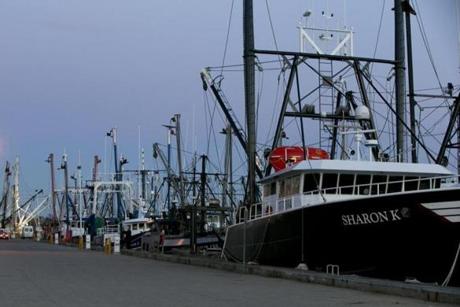 NEW BEDFORD Gail Isaksen remembers when the commercial fishing industry in New Bedford Harbor collapsed in the mid-1980s: Cash-strapped boat owners scrimped on maintenance, borrowed to buy supplies they couldn’t afford, only to see their livelihoods destroyed. “I have a list of guys who still owe me money,” said Isaksen, 68, the owner of Fairhaven Shipyard. “I’m not getting paid. They’re not coming back.” Today, though, Isaksen’s shipyard is busy again with customers who can afford to pay: scallop fishermen. more@bostonglobe 10:21
NEW BEDFORD Gail Isaksen remembers when the commercial fishing industry in New Bedford Harbor collapsed in the mid-1980s: Cash-strapped boat owners scrimped on maintenance, borrowed to buy supplies they couldn’t afford, only to see their livelihoods destroyed. “I have a list of guys who still owe me money,” said Isaksen, 68, the owner of Fairhaven Shipyard. “I’m not getting paid. They’re not coming back.” Today, though, Isaksen’s shipyard is busy again with customers who can afford to pay: scallop fishermen. more@bostonglobe 10:21
Scallopers’ concerns about Machias Bay Navy Cable Crossing – NOAA to make final decision – Kiss that area Good bye!
![]() The impact on the scallop fishermen will not be clear until NOA decides how the cable will be designated on nautical charts — either as a cable line or a cable area. The agency will not make that decision until after the project is completed. The decision criteria includes the depth the cable is buried. more bad news @bdn 22:33
The impact on the scallop fishermen will not be clear until NOA decides how the cable will be designated on nautical charts — either as a cable line or a cable area. The agency will not make that decision until after the project is completed. The decision criteria includes the depth the cable is buried. more bad news @bdn 22:33






